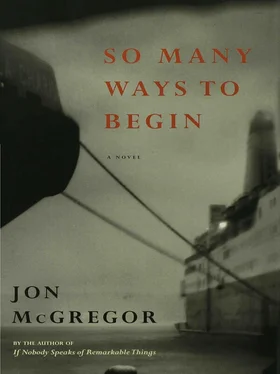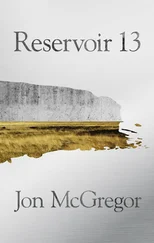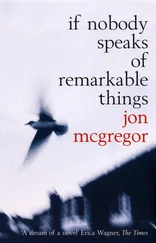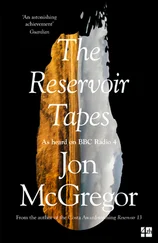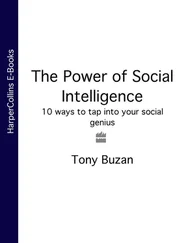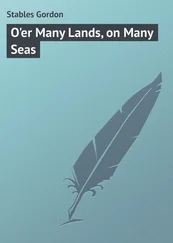I don't know, he said, a couple of nights here, I think, so I can try and work out where to go next. He read the names in the visitors' book on the table beneath the phone, turning a few of the pages. How're things at home? he asked.
Fine, she said quickly. You know, fine. Weather's nice. Your mum said she might come round tomorrow.
He closed his eyes a moment. There were things he wasn't saying, and he wanted to say them. He wanted to tell her how he felt now that he was finally there, that he was at once excited and disappointed, that he'd been surprised to feel no sense of homecoming; how utterly lost he had in fact felt when he'd arrived. But he wasn't sure if she wanted to hear these things, or if she wanted him to be there at all, and so he said nothing.
And how's Kate doing? he said.
Well, she's fine, she said. You want to speak to her? He said that he did, and he listened to Eleanor holding the phone out, leaning over to Kate and asking if she wanted to speak to her daddy. He heard the soft whump of the sofa cushions, and pictured Kate burying her face in them, trying to hide herself. Eleanor spoke again. She's gone all shy on you, she said, a smile in her voice. She misses you, you know, already.
I know, he said. He hesitated, looking to see if the woman was still setting the tables in the dining room, lowering his voice. And you're okay? he asked.
Yes, she said. I'm fine. He heard the edge of her voice tighten, and knew that she'd closed her eyes.
You've been making sure you take them then? he said. You haven't missed any? There was a long silence, without even the sound of Eleanor's breath reaching down the phone line to him, and he wasn't quite sure if she was still there. Eleanor? he said.
Yes David, she said. Yes, I have. He heard Kate running into the kitchen and dragging a stool across the floor, and he heard Eleanor telling her not to do that, the phone lowered away from her face. I've got to go, she said, speaking to him again.
Right, he said, okay. He started to say look sorry, I didn't mean to, and he heard something breaking in the kitchen, a plate or a glass, and Kate screaming in surprise, and Eleanor telling her not to move. He said I love you, I'll be home soon, over the noise, but he wasn't sure if she'd heard.
On his first morning in Donegal, after breakfast, he walked through the town centre, calling into a newsagent's by the market square to buy a handful of postcards, sending one to Eleanor and Kate and keeping the rest to stick into a scrapbook. The streets were busy with people shopping, women mainly, standing at shop counters set just in from the door, loading cuts of meat and handfuls of vegetables into cloth shopping bags, chatting to the flat-hatted shopkeepers or to the women beside them in the queue. He found himself looking out for women in their late forties and early fifties, stupidly, as if he might somehow catch the eye of one and recognise something in her face, and be recognised in turn.
He walked away from the square, past a small ruined castle and across a river, looking for the town library. It was closed. There was no museum. He walked along the river to a jetty, watching some men unloading armfuls of netting from their boat. He went for a drink in a bar, barely able to see for a moment as he stepped in from outside, blinking quickly and asking for a stout. At the edge of town, just off the Ballybofey Road, in a steeply sloping field beneath an oak tree, he found a memorial stone to the famine dead, buried together there beneath his feet.
Kate said hello to him on the phone that evening, but sank into a breathy silence when he said hello back, when he asked her what she'd been doing, as if she couldn't quite believe it was him at the end of the line.
He phoned Anna, and she said oh hello, I was wondering how you were getting on. It's been quiet at work without you there, she said, half-laughing, are you heading back soon? He told her he'd be a few more days yet, there was still plenty left to see. She said well we all miss you, speaking, as she often did, as if she meant something else, something more, and he wondered again if there really was something more to be meant. The teasing sound of her voice when she spoke like that reminded him of her fingers trailing through the hair on the back of his head, or of her breath moving across his cheek when they looked over layout diagrams together, leaning over the desk, her elbow pressed against his.
He said anyway, I was just phoning to see if there'd been any post for me, any messages I need to deal with?
She said no, nothing that can't wait. We can cope without you, you know, she added, laughing.
Oh, no, yes, of course, he said. Well, okay then. I should go.
Take care then, she said as he hung up.
He left Donegal Town and took a bus to Kilrean, a smaller place which didn't look like much more than a hamlet on the map. He was the only passenger on the bus, and he sat near the front, looking through the tall windscreen. The driver didn't say anything to him. The roads seemed wider than they were in England, but less well made, unfinished, petering off on either side into broken gravelly verges. The driver would sometimes have to steer a wide swerve around a pothole or a stretch of broken tarmac, or swing on to the wrong side of the road to slowly overtake a tractor pulling a trailer piled high with muddy potatoes. Dogs, keeping sluggish watch at the entrances to farmhouse driveways, their heads wedged between their front paws, would look up while the bus was still in the distance, running to meet it, barking and jumping and chasing it furiously away down the road. What few other drivers there were would greet the bus driver with a curt wave, usually just lifting a finger from the steering wheel and nodding, and he wondered whether the driver knew them all.
They stopped outside a pair of shops and a garage. There was a man sitting on a bench outside one of the shops, a black dog curled up by his feet. There was a long burgundy car poking out of the garage workshop, the bonnet open, two men leaning over the engine together. The driver turned to him.
Are you getting off then? he asked. David looked at him, and back out of the window.
Is this Kilrean? he asked.
It is, the man said, pointing at the door to clear up any confusion.
Kilrean, Ballybofey, Raphoe, Kilross; he stayed a night in each, walking around the area, calling into a shop or a bar, ready for conversation but not sure how to begin. Once or twice, with a couple of beers inside him, he said something to a barman like, I'm looking for a woman, Mary, Mary Friel, she was in London during the war, you don't know of anyone do you? And the barman would say something like, I don't know if I can help you there, or that's a long shot isn't it, or we're all looking for a woman, son. And David would smile, and shrug, and say yes, it's a long shot, not to worry; until one evening in Kilross an older man sitting beside him said, Friel was that you said? You want to head up to Fanad if it's Friels you're after.
He phoned Eleanor each evening, a stack of small coins ready beside the phone, and told her what he'd done that day, where he was, who he'd seen or met or spoken to briefly. He turned each coin over in his hand as he spoke, looking at the dates and designs embossed on them, the harps and salmons and bulls. I know it seems strange but it feels like it's worth it, he said. I know she might not even be here but at least I'm getting a look at the place. It's some thing, he said uncertainly. I love you too, he said each evening. Tell Kate I'll be home soon, tell her I love her, tell her to be good. He always paused a moment before putting the phone down, listening to the click and buzz of the broken connection.
He looked out for museums, but there didn't seem to be all that many around. He found one in Letterkenny, and spent the afternoon in there, reading the mainly handwritten display boards above the few artefacts. He read about burial chambers and dolmens, the fragments of shields and beakers and belt buckles found beneath the stacked slabs of rock. He read about farming in the Middle Ages, and expressions of religious faith, and the dominance of the oral culture. He read about the coming of the English and the Scots, the battles against the landlords, the potato blight, the starvation and desperate emigrations, the villages left abandoned and burnt. He read about the uprisings, and partition, and then there were photographs to look at and his interest in the stories faded as he studied the blurred faces looking out at him from those white-washed walls. He didn't know what he was looking for; some familiarity in a glance, a nose, a jawline or a posture which might catch him by surprise, something he could recognise. Something which would make someone stop and say well now, would you look at that. He's got your eyes. He's got your smile. He's got the same tiny curl of skin at the corner of his mouth. That's the spit of you. He wanted a photo he could rip off the wall, and show to someone, and have them say something like this. It would be a start. It would be something to go on.
Читать дальше
Конец ознакомительного отрывка
Купить книгу
